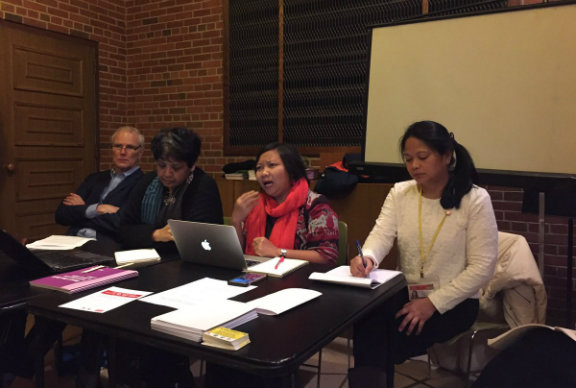Just one day at the 61st session of the Commission on the Status of Women (CSW61) showed me that this year’s theme, ‘Women’s Economic Empowerment in the changing world of work’, may finally bring some well-deserved attention to the feminization of migration and the plight of women in domestic work. But – will this attention actually result in measures to protect their rights? For those paying attention, Hivos’ panel discussion on 13 March, “I work without Rights, Do you care?” revealed some very necessary steps to take.
Why do women become migrant workers?
One of the main questions that puzzles most of us is why women leave their families behind to make a living abroad. Anis Hidaya of Migrant CARE Indonesia highlighted a few of the root causes during the panel, including feminization of poverty, violence against women, child marriage and low levels of participation in decision making. This vulnerability is exacerbated by the fact that women’s rights are not included in Indonesia’s development agenda. Paternalism is particularly evident in the country’s migration law no. 39/2004, where only two of its articles refer to women, namely that they need permission from their husband or family to migrate for work and they cannot migrate when they are pregnant.
Isolation starts in home countries
After being lured or forced into labour migration, the high fees women pay recruitment agents lead to debt bondage right from the start, as pointed out by Rowena Arangorin, a Filipino domestic worker in Hong Kong and Secretary of the Progressive Labor Union of Domestic Workers (PLU). Furthermore, agents lock the women up inside “training centers” to secure their investments. So the women’s isolation begins in their home countries and will not end until they return some years later.
The ILO Domestic Workers Convention 2011 (N. 189) did bring change to the legal situation of migrant domestic works worldwide. Since the convention came into force in 2012, 23 countries have ratified it and around 50 countries have included domestic workers in their labour laws.
Gulf Cooperation Council countries lag behind
Unfortunately, this is not yet the case in the majority of the six Gulf Cooperation Council countries, where 2-3 million migrant domestic workers are employed. Here, the ‘kafala’ or sponsorship system binds the worker to the employer by not allowing him/her to change employment or leave the country without the employer’s consent. Employers confiscate domestic workers’ passports and phones to ensure they will not run away.
The panel’s keynote speaker, UN Special Rapporteur on Extreme Poverty and Human Rights, Philip Alston, reported on the situation of migrant domestic workers in Saudi Arabia. He highlighted non-payment of wages as the most consistent violation in the Kingdom. In addition, he explained that embassies of countries of origin are hesitant to support migrant domestic workers out of fear of losing their position as a country that supplies labour.
Marieke Koning of the International Trade Union Confederation and Elizabeth Tang of the International Domestic Workers Federation stressed the need for migrant domestic workers to organize, while admitting how difficult this was in practice. First of all, local labour laws often do not recognize domestic workers, let alone their right to form unions. Secondly, how would an organizer even reach workers who are literally locked up inside the homes of their employers?
To conclude, the panel called for the following actions:
- Give migrant domestic workers more visibility in the Human Rights Council. The HRC has more than 25 special rapporteurs, but they pay little attention to the rights of millions of migrant workers. The UN Special Rapporteur on human rights of migrants is occupied with the global refugee crisis and the UN Special Rapporteur on trafficking in persons can cover only part of the issue. As a result, migrant domestic workers’ rights are under-represented in the international human rights agenda.
- Strengthen and reform education systems for migrant domestic workers before departure. Pre-departure training should not only cover skills development, but also education on rights.
- Persuade village authorities to take a role, providing data on mobility and connecting with the migrant domestic workers from their villages.
- Gulf countries in particular should reform labour laws in line with the ILO Domestic Workers Convention C189. While model contracts exist in Bahrain, Oman and the UAE, these cannot be enforced in court.
- Allow the right to organize and form unions, and enhance coordination between unions and movement building initiatives.
- Include employers in the response. They are part of the issue and should become part of the solution. Targeted and sensible advocacy with employers can contribute to an enabling environment that allows better protection of migrant domestic workers’ rights. This employer advocacy can be supported by businesses and embassies, as they have considerable influence on their staff and communities who employ foreign domestic workers.
Panelists:
- Keynote speaker: Philip Alston, UN Special Rapporteur on extreme poverty and human rights
- Rowena Arangorin, a Filipino domestic worker in Hong Kong and Secretary of the Progressive Labor Union of Domestic Workers (PLU) (Philippines, Nepal, TBC)
- Elizabeth Tang, General Secretary, International Domestic Workers Federation
- Marieke Koning, expert on gender equality and domestic work issues, policy advisor, International Trade Union Confederation
- Anis Hidaya, Study and Research Center on Migration, Migrant CARE, partner in the Shelter Me Project
- Priti Darooka, director, Programme on Women’s Economic, Social and Cultural Rights (moderator)




